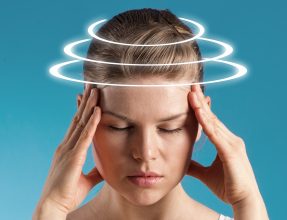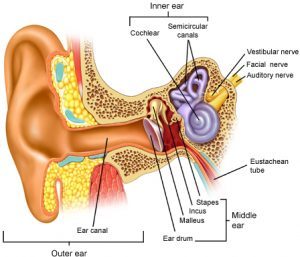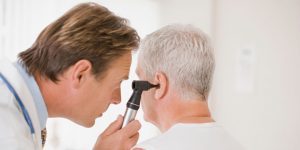Vertigo
What is vertigo?
Vertigo is the sensation that you are spinning when you are not actually spinning or the sensation that objects in your environment are spinning when they are not. These episodes of dizziness can last a few seconds or can persist for days. Individuals experiencing dizziness may have difficulty walking, maintaining balance and may be suffering from other symptoms.
Vertigo is a symptom rather than a condition in itself and it can be experienced in mild to severe forms.
What other symptoms accompany vertigo?
Accompanying symptoms can include: nausea, headache, sweating, tinnitus (ringing in your ears), hearing loss and nystagmus (involuntary jerking eye movements). There are a many different causes of dizziness and therefore not everyone experiences identical symptoms
How do our bodies maintain balance?
To understand what causes dizziness we first need to understand how our bodies maintain balance. There are three sensory systems that keep us oriented in our environment and help us stay balanced. These systems are the vestibular system, the visual system and the proprioceptive system.

When there is a problem with any one of these systems we may have difficulty balancing and may experience dizziness. The vestibular system gives the majority of information about orientation and balance, therefore often vertigo is frequently caused by a problem with the vestibular system.
What is the vestibular system and how does it work?
The vestibular system includes some structures within the inner ear, the nerve that carries information about balance to the brain and the area within the brain that processes this information. If there is damage or a problem to any of these components, difficulties with balance may be experienced.

The cochlear and the vestibular system make up the inner ear. The cochlea is responsible for transforming sound waves into electrical impulses that can be sent to the brain. Whereas, the vestibular system is responsible for receiving information about balance and sending this information to the brain. Due to the close proximity of the hearing system and the vestibular system, when an individual is experiencing vertigo there may also be accompanied hearing loss.
The vestibular system contains the following structures: the semicircular canals, the utricle and the saccule. The semicircular canals are filled with fluid. When our head moves the fluid within the semicircular canals also moves and this information is sent to the brain where it helps us perceive when our bodies are rotating and how they are rotating. The utricle and saccule help us sense when are bodies are accelerating.
What are the causes of vertigo?
There are many possible causes of vertigo. The main causes are listed and described in the table below.
| Vertigo Cause | Description |
|---|---|
| Looking down from high up | Some people experience a spinning sensation when they are looking down from a high place. This sensation should disappear when the person is no longer looking down. |
| Spinning yourself | It is normal for a spinning sensation to remain after you have been spinning for a while. You will no longer have this sensation once the fluid within the vestibular system stops rotating. |
| BPPV (Benign paroxysmal positional vertigo) | Occurs when calcium crystals dislodge and float around in the fluid within the vestibular system. People with BPPV usually experience episodes of dizziness that last for about a minute and are triggered by head movements. |
| Meniere’s disease | Meniere’s disease is a condition that causes progressive deafness. It is accompanied by episodes of tinnitus and dizziness due to damage to the inner ear. |
| Labyrinthitis and vestibular neuritis | These are conditions in which there’s an inflammation of the inner ear or an inflammation of the nerve that connects to the inner ear. |
| Head or neck injury | A head or neck injury may damage inner ear structures resulting in difficulties perceiving orientation and maintaining balance. |
| Brain problems | For example, a stroke or tumour may result in damage to the parts of the brain that receive and interpret information about balance. |
| Medications | Some medications cause damage to the inner ear as a side effect. |
| Migraine headaches | Migraines may be accompanied by dizziness. |
| Acoustic neuroma | An acoustic neuroma is a tumour on the nerve connected to the inner ear (the vestibulocochlear nerve). |
| Autoimmune disease of the inner ear | This may damage parts of the vestibular system leading to dizziness. |
| A range of other causes unrelated to the inner ear include: cardiovascular problems, neurological, metabolic, vision problems or psychological problems |
How is it diagnosed?
A doctor will gather a comprehensive case history by asking you questions about your medical history and questions about the vertigo (e.g. When did it start? How often do you experience it? Do you feel nauseous when you feel dizzy? Have you been having difficulty hearing?) . Your answers to these questions will help the doctor determine the cause of your symptoms. Your doctor will then conduct a physical examination and determine whether further tests are required. Further tests could include medical imaging or a hearing assessment.

A hearing assessment will be conducted by an audiologist to determine the type and degree of hearing loss or to rule out hearing loss. If a hearing loss is identified the audiologist can help you select the best treatment option to improve your hearing.
What are the treatment options for vertigo?
Some individuals find they don’t need treatment as their bodies learn to adapt to the changes in their balance system after a while. However, if your body doesn’t adapt there are a number of treatment options and these are listed below.
| Vertigo Treatments | Description |
|---|---|
| Vestibular rehabilitation therapy | -Performed by physiotherapists or occupational therapists who specialise in this area -Involves exercises that assist to reduce dizziness -Suitable for those with dizziness due to inner ear problems |
| Canalith repositioning procedure | -Suitable for those with dizziness due to BPPV (Benign paroxysmal positional vertigo) -Involves head positioning manoeuvres |
| Diet modifications | -Some people with Meniere’s disease find that adapting their diet helps manage their symptoms -E.g. Avoiding caffeine, drinking sufficient fluids every day and avoiding alcohol -For more information discuss dietary modifications with your doctor |
| Medications | -Some medications can be prescribed that reduce the sensation of spinning -However, often it is important not to rely on these initially to allow the body to adapt to changes in the vestibular system |
| Surgery | A range of surgical procedures can be performed on the inner ear to improve balance. |
| Hearing aids | For those with accompanying hearing loss, hearing aids may also be appropriate to amplify the sound around them and improve hearing. |
